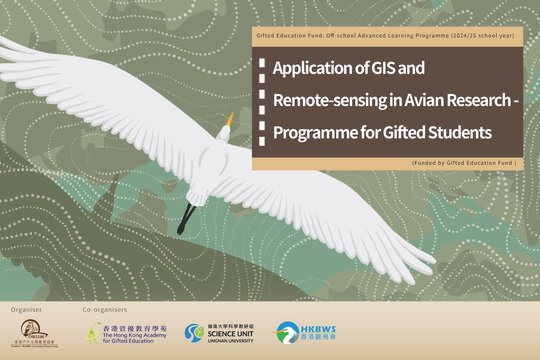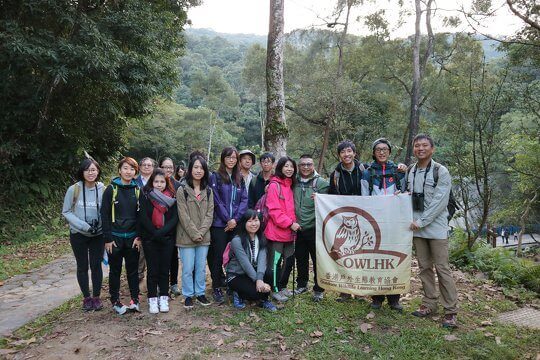Terrestrial Ecology

Application of GIS and Remote-sensing in Avian Research — Programme for Gifted Students (Funded by Gifted Education Fund)
Despite being a small region, Hong Kong accounts for 40% of all bird species in China. Such biodiversity is indeed impressive! Funded by the "Gifted Education Fund", we organised an eight-month off-school advanced learning programme (Programme number: 2024-04), for 50 P4-P6 students. Students were encouraged to utilise Geographic Information System (GIS) and remote sensing to explore various possible solutions for bird conservation.

“Nature-based Solutions - Hong Kong Forest Ecology and Carbon Neutrality Programme for Gifted Students”
Hong Kong, often referred to as the "concrete jungle," is covered by vegetation on almost 80% of its land. These vegetations can potentially serve as a nature-based solution to climate change. Funded by the "Gifted Education Fund," the program recruiting primary school students starts in 2024. Students explore the relationship between humans and forests through diverse learning activities. They will also investigate how forests can help Hong Kong address climate change and achieve carbon neutrality.

Environment and Conservation Fund Insect Pollination Ecology Education Programme
When it comes to insect pollinators, our first impression is always bees. Yet, do you know that pollination does not rely on bees only? Via the “Environment and Conservation Fund Insect Pollination Ecology Education Programme”, we wish to promote the ecology and diversity of insect pollinators in Hong Kong. To lead woodside field trips for various age groups, encourage them to experience and understand the importance of insect pollinators.
Meanwhile, the brand new ecological conservation tool "Insect Hotel" is used as the main element throughout the programme. It encourages students to observe wild insect pollinators proactively and take the initiative in urban insect pollinator conservation.

ECF Spider Survey Ecological Education Programme
Spiders are often feared of, but they are almost omnipresent, and their niches are irreplaceable in the food chain and the ecosystems. Through ‘ECF Spider Survey Ecological Education Programme’, we aim to eradicate participants’ misunderstandings through comprehensive educational activities and outdoor field trips. The Programme also initiated the first large-scale citizen science baseline survey on spiders in the community, and established an accessible local spider database, so as to raise public’s awareness on local biodiversity.

Hong Kong Insect Ecology Programme for Gifted Students
Insects are so tiny, yet play a crucial role in the ecosystem! Based on insect ecology. This programme is designed to reinforce the knowledge of ecology and biodiversity in gifted primary students, and to develop their skills in carrying out scientific research and devising relevant applications. In the long term, it aims to establish students’ positive attitude and value towards the environment.

Exploring Hong Kong Biodiversity – TrailLight.Nature Logbook Activity Forest Exploration Logbook
Exploring Hong Kong Biodiversity – TrailLight.Nature Logbook Activity is a funded programme under the Subventions for Biodiversity Education (2020). As part of the programme, the Forest Ecology Nature Logbook Activity invited public participants and professional ecological illustrators to conceive and design collectively to publish a self-motivated and sensation-driven ‘Forest Exploration Logbook’ (The Logbook). The Logbook compiles missions integrating with delightful and artistic elements in games, differing from conventional ‘fill-in-the-blanks’ mode of observations and recording. It aims at raising public’s motivations to learn in the outdoors, as well as developing children’s senses and interests to the nature.

Gifted Education Fund: Off-school Advanced Learning Programme
Urban Ecology x GIS: Talent Education Programme for Gifted Students
Urban Ecology x GIS: Talent Education Programme for Gifted Students, held from February 2021 to April 2022, aimed to strengthen gifted students' understanding of ecology and biodiversity. Through a series of training sessions, students developed their research skills on urban vegetation, birds, insects, amphibians, and reptiles. Students then utilised Geographic Information Systems (GIS) to collect and represent ecological data for the purpose of environmental conservation.
OWLHK Plant Diversity
Collaborating with Hong Kong Biodiversity Festival 2016 which organized by Environment Bureau and Agriculture, Fisheries and Conservation Department, we exclusively organized a series of docent activities to the public. We introduced the diversity of plants and the characteristics of plantations via educating in the environment. We provided field trips in 3 sorts of plantations: a secondary forest developed by natural succession through decades, a Fung Shui Wood implicating the traditional wisdom and local culture, as well as shrubland which is the largest plantation in Hong Kong.
Intergeneration Eco-classroom -
Amphibians and Reptiles
Co-organizing the Intergeneration Eco-classroom with Lingnan University, we developed this programme for tertiary students and senior citizens. It introduced the knowledge of amphibians and reptiles, particularly the conservation of them in Hong Kong. Instructed through indoor lectures, field trips and finishing the required individual and group tasks, there were 60 participants received a certificate of Conservation Ambassador of Amphibians and Reptiles.
ECF Hong Kong Forest Conservation Ambassador Scheme
Do you know how many forests are there in Hong Kong? Hong Kong is known as a concrete jungle, while the public neglects her biodiversity within. We organized the Forest Conservation Ambassador Scheme and educated 40 tertiary students via 7-day comprehensive training. Afterwards, the students led 20 groups of secondary school students, altogether 80 students, as the training of Forest Conservation Ambassador. Throughout practising the knowledge in activities, it facilitated the promotion of forest ecology and biodiversity to the society.

The Ambassador Training of The Forest Project
The Ambassador Training of The Forest Project is found by TWGH Tuen Mun Integrated Services Centre, with the theme “Connect Nature, Reconnect Life”. Encouraging the public to experience our mother nature, we organize the programme with lectures and field activities. Within the programme, we introduce the ecological topics including plants, vegetation, the biodiversity of amphibians and reptiles. So that the participants have a better understanding of the basic knowledge of ecology.

Lantau Freshwater Ecology Classroom
Hong Kong has a high species diversity of insects, but it is mostly obscure to the public. Therefore, we are organizing the Lantau Freshwater Ecology Classroom - Tertiary Student Tutor Training (Stream) in the ECF Discovering South Lantau Invertebrates. Through this programme, we instruct the tertiary students in freshwater ecology and biodiversity, by indoor lecture and field study in Lantau streams. Students are trained to be tutors and are empowered to lead the subsequent Citizen Science Survey. Therefore, the participants can contribute to the betterment of the conservation of freshwater ecology in Lantau.












